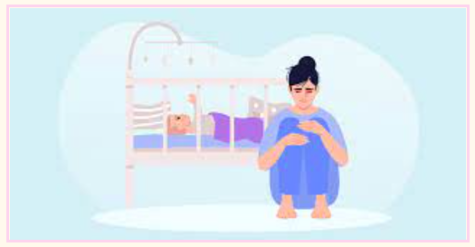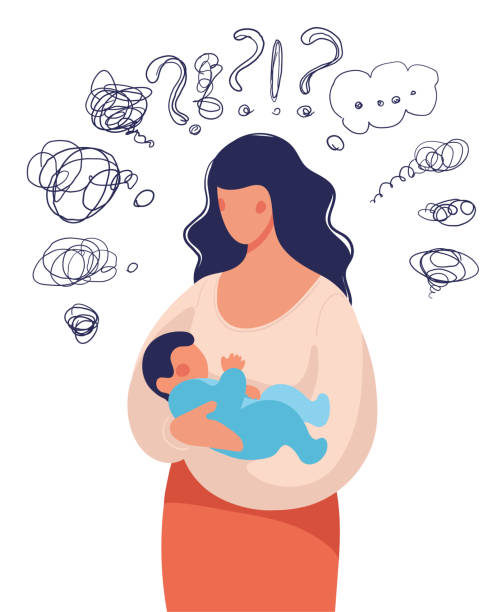Your donation will support the student journalists of Brunswick High School. Your contribution will allow us to purchase equipment. We're a small program with little resources. Our goal is to purchase some updated, and much needed, cameras for the program.
Through a Woman’s Eyes – Postpartum Depression
The Untold Experiences From Two Moms
February 28, 2022
This article contains potentially triggering topics: depression and postpartum depression.
Please be aware of your mental state before reading and reach out to the appropriate source linked below the article.
Birth—Everyday a new little life is being brought into the world. We welcome them without the knowledge of what they bring to the world. A struggle that faces a blind eye is the emotional struggles that come with becoming a parent. For women, we go through not only physical change but emotional and mental changes. It can completely turn your whole life around. Women go through nine months of pregnancy and then a labor that can last for hours. Not to mention the fear that comes with being a parent for the first time. Your responsible for a tiny human being for the rest of your life. That might seem like a easy task but it’s not. You could be raising the future president and not even know it yet.

The physical change is one of the most highest rated questions asked to women who have just had a baby. These changes are different for everyone but some of the most common changes are: larger hips to accomodate child birth, their breasts have grown anywhere from two cup sizes or more, their old clothes don’t fit anymore, their hair is growing and/or falling out, their nails are normally breaking, their shoes might not fit their feet anymore. That’s only the beginning of it. The emotional struggle usually follows shortly after. The beginning of sleepless nights and eye bags are slowly creeping their way in. No one notices, all everyone cares about is seeing that newborn baby. The endless night shifts, “taking turns,” staying up all night just to make sure that little life you created is still breathing.
The worry begins to set in around this time to, causing you to panic over every little cry, whine, cough, sneeze. The panic that hits you when they run a fever for the first time, throw up for the first time, you sit there wondering about a million possibilities of what could be wrong with this little one. But one thing someone always tells you is that it’s going to be hard and easy at the same time. It’s going to be hard leaving that baby one night for a much needed date night but it’s going to be easy because you know you’re coming back to that baby at the end of the night. The times you’re going to have to put yourself first is going leave you feeling guilty—like a bad parent. All around the world right now, this is what women are going through.
As young females ourselves, we only worry about if our cycles or acne or if our shorts from last summer are going to fit or if our crush likes us back. Not many of us have to worry about taking care of a little baby, but some do on top of school work and other stressors. We are often warned from a young age that we need to wait to have a baby and it’s a way of protecting ourselves from these struggles too soon.
We asked a few local moms their opinion on Postpartum Depression and how it has affected their lives and here is what one mom had to say:
What is postpartum depression through a woman’s eyes?
“I think Postpartum Depression can be very limiting, depending on the woman for what their issues are. In my experience, it’s shocking coming home with a human being and not knowing what you’re doing, like you don’t even get to recover mentally and physically, you’re exhausted, you’re learning to keep something so small and precious alive and do it well with so much love but at the same time you’re physically recovering and you’re tired and you’re doing that with the least amount of sleep you’ve ever had in your life. Now also add hormone shifts and everything else to that and I think it can definitely affect people differently.”
If you’ve had kids before did you develop Postpartum Depression?
“I did not have Postpartum Depression with my second, I think like I said before, it’s a shift in anticipation of what you’re doing but I was fortunate where I didn’t have any physical issues. I had natural births. I had natural experiences so I didn’t have any drastic hormonal issues or medical problems—not that that is a problem for some people—there are definitely other conditions that are in place that can make it worse. So, I mean it’s hard to give birth, it’s hard to be a woman and have a baby and then lose your hair, your skin stretches out and everything about your body that was just so luscious and great—literally as your harboring another being your body is just suddenly in complete shock and jolt—there a lot of different things that can go into that. Having multiple kids and then having another is a shift too because now you’re dealing with two or more kids. When it came to Postpartum Depression I was fortunate enough to not have any drastic issues or need medication or other help. But having support and therapy and having a village behind you goes a long way—not just for women but the husbands too and anyone else in your family when you do bring another child into it. You do need to keep that in mind; [birth] is a transition for everyone.”
Do you think previously having a kid before your second helped with any symptoms you might have had?
“Yes, I was really fortunate because both my kids were only 16 months apart so only a year and a half of transition. My body was used to it, my body had just gone through it and I kind of knew what to expect now that I had one child under my belt and I knew what to do. The basics were easier: feeding purposes, their sleep cycles and routines, different tasks of life, and milestones they should be achieving. So you kind of expect what needs to happen next and what you’re anticipating whereas the first time you’re just going through it blindly and hoping for the best and/or relying on other people to help you through the process.”
Mrs. Minch, a staff member at Brunswick High, who is currently pregnant answered a few questions on the topic as well:
“My first question is have you had any regular depression while being pregnant or if you are currently struggling with Postpartum Depression how do you think you’ll deal with it?”
“Yup, I think having a child already has helped me prepare for what is going to come because the first time around you have no idea what to expect, all seriousness you have no idea what your body’s gonna do, how your hormones are gonna react, it’s crazy, but I feel as if I have a better understanding with how my hormones are fluctuated now and that I’ll be able to have more control over this time around because I know what to expect,” Minch said.
How do you think it affected your relationship with your husband?
“With him he was very understanding, it really was more so that I needed to work through these issues and he was very supportive in that aspect that if I needed him, he was there. It was like, ‘Hey I need to be here for my wife because she’s going through so much with Postpartum,’ Minch said.
So how do you think in your opinion that we could try to find ways to raise awareness about Postpartum Depression?
“Be more open about it, I don’t think that is something discussed. I really don’t, you know you get pregnant, have a baby but people are like, ‘okay! Well you need to prepare for the sleepless nights and how the baby is like you really got to focus on the baby but it’s not just about the baby, it’s about you too. If you are not taking care of yourself, you’re not being the best person that you can be. And I don’t feel as if women and men are educated enough because, you know, not every husband is aware of the outcome of Postpartum Depression and I think it’s something that definitely needs to be talked about more,” she responded with a strong tone.
So what was the hardest part of either a previous pregnancy or your current pregnancy?
“My previous pregnancy you know wasn’t bad and this one hasn’t really been either,” she said.
After interviewing these incredible, strong women, we began to realize the struggles women go through with having a baby whether it be the first time or the second or beyond. We look up to these women, whether that’s in school or outside of school in a public setting. These women still come to school or work and get their jobs done while silently battling what Postpartum can be in all its different forms. It can be a very discouraging illness for some. The emotional strain can take a toll on one’s mental health so remember next time you go to be rude or disrespectful towards a woman, no matter a teacher, an aide, a substitute, a boss, a nurse, a co-worker or any women in general, if they have children—they may be silently suffering with more than they show. We as a community—especially as young women in society—need to raise more awareness to this topic of Postpartum Depression in connection to depression in general.
Depression is common and treatable. If you think you have depression or postpartum depression, seek treatment from your health care provider as soon as possible or the resources below.
Pregnancy Risk Assessment Monitoring System (PRAMS): https://www.cdc.gov/prams/index.htm
Suicide Hotline: 1-800-273-8255

Bettie Crutchley • Mar 3, 2022 at 9:07 am
WOW!!! Fantastic article. So needed in today’s world. This should be taught to women before, during, and after giving birth. Information so needed. Could relate and I’m 76 yrs. old. Not even discussed when I was pregnant, deal with it was the answer. A must read. BHS be proud of these two young women for bringing to light mental health issues.
Bettie Crutchley